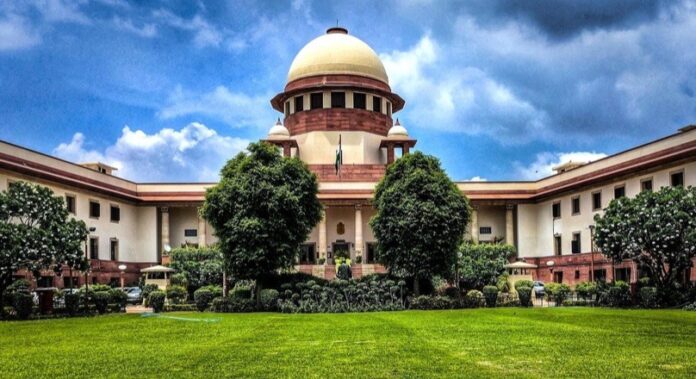By Syed Khalique Ahmed
NEW DELHI—The Supreme Court on Thursday ordered stay on screening of Islamophobic film – “Hamare Baarah” – and asked the Bombay High Court to decide the case on merit.
The permission for the screening of the film which is highly offensive to Muslims and Islam, was given by the Bombay High Court itself. It was to be screened from June 14.
Surprisingly, the creative director of the film, Ajendra Ajay, is chairman of the Badrinath Kedarnath Temple Committee in Uttarakhand, indicating how deeply is Islamophobia ingrained in a section of the religious leaders of the majority community?
The temple committee is an autonomous body under the state government of Uttarakhand and its chairman holds the rank of Minister of State as per information posted by Mr Ajendra Ajay on X (formerly twitter) platform. He introduces himself as Ajendra Ajay (Modi ka Parivar) on X, indicating his proximity with the central and state BJP governments. The committee manages 64 temples in Uttarakhand.
But the encouraging point is that the Hindu majority is secular and wants to live in peace with other religious communities as evidenced by their rejection of the Hindutva brand of politics based on hatred to minorities, particularly Muslims, played by the BJP and Prime Minister Narendra Modi.
The apex court order was given by a vacation bench of Justices Vikram Nath and Sandeep Mehta on a petition filed by Pune-based social activist Azhar Basha Tamboli and Association for Protection of Civil Rights (APCR) who had challenged the Bombay High Court order.
The film’s trailer released recently demonises the Muslim community for population explosion though the film nowhere substantiates it allegations with evidence. The Indian government statistics with regard to population growth do not suggest any such thing.
The film also has other things in it, reflecting it to be an attempt to defame Islam and its followers. For example, the film shows a woman in a burqa questioning why only women will go to hell, an allegation which cannot be cited in any Islamic scripture.
In fact, Islamic scriptures including the Holy Quran, the primary source of Islam, says that whether a man and a woman will go to hell or heaven, will depend on their deeds, and nothing else. So, the film is basically a distortion of the teachings of the Quran and the Hadith, statements and practices of Prophet Mohammed, indicating it is a deliberate attempt to defame Muslims and Islam.
Yet, the Bombay High Court allowed its screening. The order encourages promotion of an anti-Islamic narrative doled out by radical elements of the majority community.
ALSO READ: Films Weaponized Against Muslims? After The Kerala Story,’ ‘The Kashmir Files,’ now ‘Humare Baarah’ Sparks Islamophobia Controversy; Muslim Leaders Call for Ban
During the hearing on Thursday, the apex court judges said they had watched the movie trailer on Youtube and found it to be offensive. “Today morning we have seen the teaser. It is as such with all those objectionable materials. The teaser is available on YouTube,” Justice Mehta was quoted by several news portals to have said during the hearing.
After the Central Board of Film Certification (CBFC) granted certification to the film, Azhar Basha and APCR moved the Bombay High Court seeking cancellation of the certification and an order against screening of the film. The film was to be released on June 7.
Basha alleged in his petition that the film was highly insulting to Islam and married Muslim women. The trailer of the film shows that married Muslim women have no independent rights as individuals, based on misinterpretation of verse 223 of the Quran. The entire message of the film is against the rights of women given in the Holy Quran and statements of the Prophet.
Basha demanded a ban on it under Article 19(2) that allows restrictions and curbs in the interest of maintaining public order and prevent incitement to an offence. He also demanded ban under Article 25 which says that freedom of expression is not absolute but subject to public order, health and morality. Basha also argued that the film contravened the provisions of the Cinematographic Act, 1952.
After hearing Basha, the Bombay High Court restrained the film producers from releasing the film until June 14 and asked setting up of a three-member panel to watch the film and give its report. The court, mysteriously, allowed the release of the film from June 14 when the committee could not submit its report and demanded time, and film makers submitted before the high court court that they would remove the offensive portions voluntarily.
Basha and APCR then moved the apex court, challenging the decision of the Bombay High Court.





